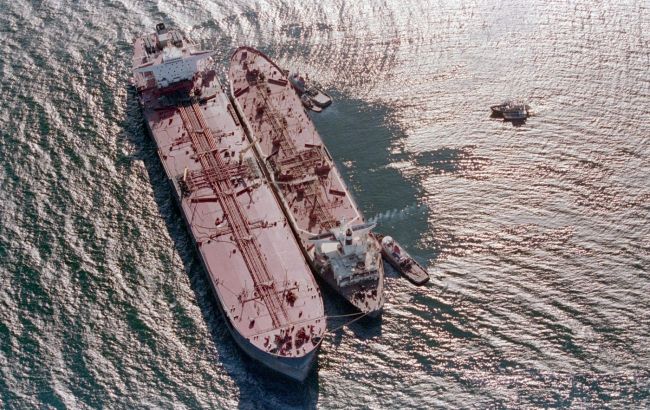EU intends to open new front in Baltic Sea in covert war with Russia - Politico
 Photo: The EU will massively detain tankers of the Russian shadow fleet (Getty Images)
Photo: The EU will massively detain tankers of the Russian shadow fleet (Getty Images)
European countries are negotiating large-scale detentions of Moscow's oil tankers in the Baltic Sea. New legislation is currently being drafted to give these measures legal weight, Politico reports.
As noted in the agency, Finnish authorities seized the Eagle S tanker in December in a large-scale operation, suspecting that it had damaged an underwater power line connecting Estonia to Finland. The detention of the vessel, which was carrying 100,000 barrels of oil from St. Petersburg, marked the opening of a new front in the secret war between Russia and the West.
According to Politico's sources, proposals under consideration include using international law to arrest ships for environmental or piracy reasons. If that fails, countries could act on their own, jointly introducing new national laws to detain more ships in more distant maritime zones.
“Close to 50 percent of sanctioned trade [in Russian seaborne oil] is going through the Gulf of Finland,” said Estonian Foreign Minister Margus Tsahkna.
According to him, there are environmental threats, “there are the attacks we’ve had against our undersea infrastructure.”
“Now the question is … what can we do with these ships?” he told Politico. “We cannot block all the sea, but we can control more … There are lots of opportunities.”
The talks illustrate Europe's growing frustration that Russia continues to transport its oil and evade Western sanctions by relying on an ever-growing “shadow fleet” - aging vessels with unclear owners and unknown insurance.
By doing so, Moscow has been able to preserve a key lifeline for its military efforts in Ukraine, given that oil and gas bring the Kremlin about half of its revenues. And all this is happening right under Europe's nose, on its waterways.
Shadow fleet
In 2022, the EU imposed a ban on Russian oil imports and set a price cap, together with the G7, on Moscow's international crude oil sales, hoping to cut into the Kremlin's revenues after the invasion of Ukraine.
But Russia soon found ways around these measures. Moscow's shadow fleet, which often relies on dubious insurers to circumvent oil price restrictions, now accounts for up to 17% of all oil tankers in the world.
As a result, “the shadow fleet is now transporting over 80 percent of all Russian crude oil,” said Isaac Levi, Russia-Europe lead at the Centre for Research on Energy and Clean Air think tank.
He claims that the Baltic Sea is the most important artery for this illegal trade. Typically, ships are loaded with Russian oil in ports such as Ust-Luga near St. Petersburg before making their way across the Gulf of Finland and through the Baltic Sea to the world's oceans via the North Sea.
According to Levy, 348 shadow fleet vessels left Baltic ports last year, accounting for 40% of Russia's total oil sales. This figure is equivalent to a third of Moscow's annual military budget.
War on waves
The growing number of incidents is creating a need to pursue tankers that sail with impunity in European waters - and not only with sanctions, which have proven to be too vulnerable.
“We are witnessing the fact that … there are some escape routes” in Western sanctions against Russia, Lithuanian Energy Minister Žygimantas Vaičiūnas told Politico. “That’s why countermeasures to the shadow fleet would be really helping to achieve the results, which we are not capable of achieving through the sanctions regime.”
According to officials and diplomats, in addition to the proposals coming from the EU to blacklist 74 shadow fleet tankers, the Nordic and Baltic countries are separately discussing how they can legally start seizing more vessels with ties to Russia.
According to them, the proposals mainly fall into three categories.
First, the authorities could detain vessels that risk causing damage to the local environment, such as oil spills. Given that most of these tankers are at least 15 years old and prone to defects, such accidents are a nasty possibility and have likely already occurred.
Second, officials said, authorities could use piracy laws to seize vessels that threaten critical undersea infrastructure, as they have done since late 2023 when numerous vessels damaged vital power and internet cables.
Finally, if international law does not work, countries are also discussing jointly introducing new national laws to make it easier to arrest ships. These could include a requirement for tankers in the Baltic Sea to use a proposed list of trusted insurers, officials said, which would allow countries such as Estonia and Finland to detain vessels that rely on other, less reliable operators.
According to Defense Intelligence of Ukraine, the Russian shadow fleet currently includes up to 1,000 units of mostly outdated vessels (with a total deadweight of more than 100 million tons) that export oil and oil products.

